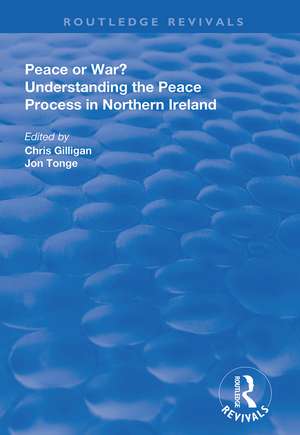Peace or War?: Understanding the Peace Process in Northern Ireland: Routledge Revivals
Autor Chris Gilligan, Jonathan Tongeen Limba Engleză Hardback – 10 iun 2019
| Toate formatele și edițiile | Preț | Express |
|---|---|---|
| Paperback (1) | 216.07 lei 6-8 săpt. | |
| Taylor & Francis – 26 feb 2020 | 216.07 lei 6-8 săpt. | |
| Hardback (1) | 764.20 lei 6-8 săpt. | |
| Taylor & Francis – 10 iun 2019 | 764.20 lei 6-8 săpt. |
Din seria Routledge Revivals
- 9%
 Preț: 767.40 lei
Preț: 767.40 lei - 9%
 Preț: 1004.17 lei
Preț: 1004.17 lei - 9%
 Preț: 934.94 lei
Preț: 934.94 lei -
 Preț: 230.80 lei
Preț: 230.80 lei -
 Preț: 294.72 lei
Preț: 294.72 lei -
 Preț: 258.66 lei
Preț: 258.66 lei - 9%
 Preț: 903.41 lei
Preț: 903.41 lei - 18%
 Preț: 695.85 lei
Preț: 695.85 lei -
 Preț: 296.10 lei
Preț: 296.10 lei -
 Preț: 342.36 lei
Preț: 342.36 lei - 9%
 Preț: 606.35 lei
Preț: 606.35 lei -
 Preț: 309.94 lei
Preț: 309.94 lei - 9%
 Preț: 729.99 lei
Preț: 729.99 lei -
 Preț: 256.94 lei
Preț: 256.94 lei -
 Preț: 230.80 lei
Preț: 230.80 lei -
 Preț: 259.47 lei
Preț: 259.47 lei - 9%
 Preț: 903.80 lei
Preț: 903.80 lei -
 Preț: 153.81 lei
Preț: 153.81 lei -
 Preț: 258.66 lei
Preț: 258.66 lei -
 Preț: 294.91 lei
Preț: 294.91 lei -
 Preț: 200.66 lei
Preț: 200.66 lei -
 Preț: 199.85 lei
Preț: 199.85 lei -
 Preț: 308.78 lei
Preț: 308.78 lei -
 Preț: 295.04 lei
Preț: 295.04 lei -
 Preț: 382.23 lei
Preț: 382.23 lei -
 Preț: 258.66 lei
Preț: 258.66 lei -
 Preț: 343.21 lei
Preț: 343.21 lei - 9%
 Preț: 640.90 lei
Preț: 640.90 lei - 9%
 Preț: 605.71 lei
Preț: 605.71 lei -
 Preț: 228.88 lei
Preț: 228.88 lei -
 Preț: 257.67 lei
Preț: 257.67 lei -
 Preț: 245.10 lei
Preț: 245.10 lei -
 Preț: 258.52 lei
Preț: 258.52 lei -
 Preț: 258.66 lei
Preț: 258.66 lei -
 Preț: 368.93 lei
Preț: 368.93 lei -
 Preț: 246.37 lei
Preț: 246.37 lei - 9%
 Preț: 764.34 lei
Preț: 764.34 lei -
 Preț: 258.66 lei
Preț: 258.66 lei -
 Preț: 326.26 lei
Preț: 326.26 lei -
 Preț: 286.98 lei
Preț: 286.98 lei - 8%
 Preț: 418.23 lei
Preț: 418.23 lei - 5%
 Preț: 231.22 lei
Preț: 231.22 lei -
 Preț: 267.15 lei
Preț: 267.15 lei -
 Preț: 295.62 lei
Preț: 295.62 lei - 9%
 Preț: 638.61 lei
Preț: 638.61 lei -
 Preț: 260.85 lei
Preț: 260.85 lei -
 Preț: 341.55 lei
Preț: 341.55 lei -
 Preț: 381.17 lei
Preț: 381.17 lei -
 Preț: 294.53 lei
Preț: 294.53 lei -
 Preț: 294.72 lei
Preț: 294.72 lei
Preț: 764.20 lei
Preț vechi: 1027.40 lei
-26% Nou
Puncte Express: 1146
Preț estimativ în valută:
146.25€ • 152.49$ • 121.54£
146.25€ • 152.49$ • 121.54£
Carte tipărită la comandă
Livrare economică 20 martie-03 aprilie
Preluare comenzi: 021 569.72.76
Specificații
ISBN-13: 9780367000837
ISBN-10: 0367000830
Pagini: 182
Dimensiuni: 152 x 229 x 18 mm
Greutate: 0.45 kg
Ediția:1
Editura: Taylor & Francis
Colecția Routledge
Seria Routledge Revivals
Locul publicării:Oxford, United Kingdom
ISBN-10: 0367000830
Pagini: 182
Dimensiuni: 152 x 229 x 18 mm
Greutate: 0.45 kg
Ediția:1
Editura: Taylor & Francis
Colecția Routledge
Seria Routledge Revivals
Locul publicării:Oxford, United Kingdom
Cuprins
Part 1. Introduction and Overview. 1. Introduction. Chris Gilligan and Jon Tonge. 2. The Origins and Development of the Peace Process. Jon Tonge. 3. Peace or Pacification Process? A Brief Critique of the Peace Process. Chris Gilligan. Part 2. Political Perspectives. 4. Divided Loyalists, Divided Loyalties: Conflict and Continuities in Contemporary Unionist Ideology. James White McAuley. 5. Unity in Diversity? The SDLP and the Peace Process. Mark McGovern. 6. From the Centre to the Margins: the Slow Death of Irish Republicanism. Part 3. Issues in the Peace Process. 7. Cross-Border Cooperation and the Peace Process. Alan Greer. 8. Security Strategies in Northern Ireland: Consolidation or Reform? Paddy Hillyard. 9. Education: A Panacea for our Sectarian Ills? Kevin Rooney. 10. The Economics of the Peace Process. Pete Shirlow. 11. The Northern Ireland Peace Process: A Gender Issue? Rachel Ward. Part 4. Conclusion. 12. Conclusion. Chris Gilligan and Jon Tonge.
Recenzii
’...makes an important contribution to current debates around the peace process and identifies the key themes and trends.’ Irish Studies Review ’One of the essential difficulties arising from the situation in Northern Ireland in recent years has been the willingness of many participants to either employ ambiguous language or to adopt seemingly contradictory positions. Several of the best sections of this volume are particularly strong on highlighting and analysing instances of such obfuscation.’ Political Studies
Notă biografică
Gilligan, Chris | Tonge, Jonathan
Descriere
First published in 1997, this volume constituted one of the first major academic examinations of the attempts to bring peace to Northern Ireland in the 1990’s, and explores the historical origins of the process, before moving towards a critical account of the role of political parties in the development of the peace process.
